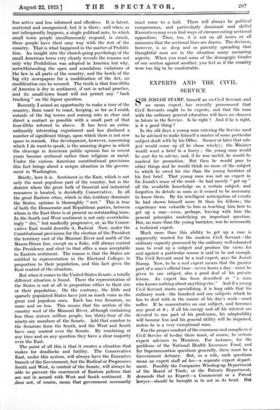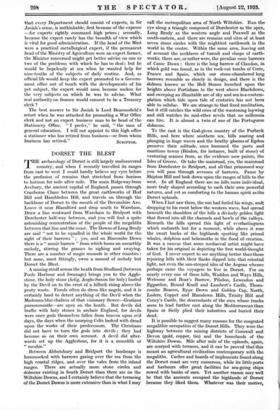EXPERTS AND THE CIVIL SERVICE
SIR JOSIAH STAMP, himself an ex-Civil Servant, and no mean expert, has recently pronounced that Civil Servants ought to be experts, and that the man with the ordinary general education will have no chances in future in the Service. Is he right ? And if he is right, is it a good thing ?
In the old days a young man entering the Service used to be advised to make himself a master of some particular subject dealt with by his Office. Sooner or later that sub- ject would come up (if he chose wisely) ; the Minister would want a brief in a hurry ; the young man would be sent for to advise, and, if he was useful, he would be marked for promotion. But then he would pass to other things and he would think no more of the subject to which he owed his rise than the young barrister of his first brief. That young man was not an expert in Sir Josiah's sense of the word—he had merely " got up " all the available knowledge on a certain subject, and .forgotten its details as soon as it ceased to be necessary to know them. By his intelligent anticipation of events he had shown himself more fit than his fellows ; the experience was valuable to him as teaching him how to get up a case—even, perhaps, leaving with him the general principles underlying an important question. But, no more than the young barrister, was he necessarily a technical expert.
Much more than this ability to get up a case is apparently wanted for the modern Civil Servant—the ordinary capacity possessed by the ordinary well-educated man to read up a subject and produce the views for and against a particular course is said to be not enough. The Civil Servant must be a real expert, says Sir Josiah Stamp. Now, to be a real expert means that the greater part, of a man's official time—seven hours a day—must be given to one subject, also a good deal of his private leisure. An expert has been described as " a man who knows nothing about anything else." And if a young Civil Servant starts specializing, it is long odds that his ordinary work—the hundred and one subjects which he has to deal with in the course of his day's work—must suffer. If he concentrates on one subject, and becomes any good at it ; if all his energy and all his interest arc devoted to one part of his profession, his adaptability will become less and his general utility will be impaired, unless he is a very exceptional man.
For the proper conduct of the enormous and complicated Civil Service of to-day there must, of course, be certain expert advisers to Ministers. For instance, for the problems of the National Health Insurance Fund, and for Superannuation questions generally, there must be a Government Actuary. But, as a rule, such questions mean an expert staff ad hoc—a separate expert depart- ment. Possibly the Companies Winding-up Department of the Board of Trade, or the Patents Department, demands that an Expert—a Commercial or a Patent lawyer—should be 'brought in to act as its head. But that every Department should consist of experts, in Sir Josiah's sense, is unthinkable, first because of the expense —for experts rightly command high prices ; secondly, because the expert rarely has the breadth of view which is vital for good administration. If the head of the Mint were a practical metallurgical expert, if the permanent head of the Ministry of Agriculture were an expert farmer, the Minister concerned might get better advice on one or two of the problems with which he has to deal ; but he would be hopelessly at sea when he wanted help for nine-tenths of the subjects of daily routine. And, as official life would keep the expert promoted to a Govern- ment office out of touch with the developments of his pet subject, the expert would soon become useless for the very subjects on which he was to advise. What real authority on finance would consent to be a Treasury clerk ?
The best answer to Sir Josiah is Lord Beaconsfield's retort when he was attacked for promoting a War Office clerk and not an expert business man to be head of the Stationery Office. " I prefer," he said, " the man of general education. I will not appoint to this high office a stationer who has retired from business—or from whom



































 Previous page
Previous page